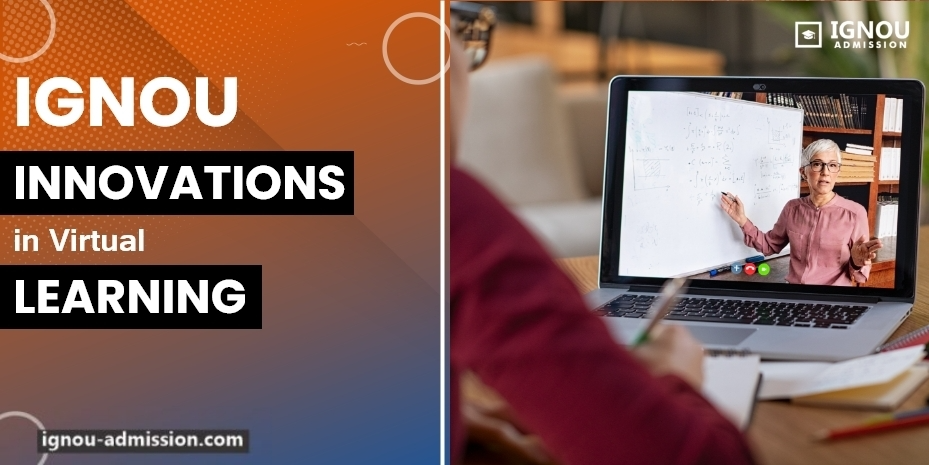The COVID-19 pandemic has forced us to embrace a new way of learning. With schools and universities closed, traditional classrooms have been replaced by virtual ones, and educators have been forced to adapt to the new normal. As a result, virtual learning has become more important than ever before. IGNOU has been at the forefront of revolutionising the way we learn online. Their interactive modules and simulations are designed to engage students in a way that traditional online courses can’t. The modules and simulations are designed to replicate real-world situations, and students are given the opportunity to test their skills and knowledge in a simulated environment. In this post, we will explore IGNOU’s interactive modules and simulations, and how they are revolutionising virtual learning. We will discuss why they are so effective, how they work, and what benefits they offer to students who are looking to get the most out of their online learning experience.
Contents
- 1 1. Introduction to virtual learning and its benefits
- 1.1 2. The need for interactive modules and simulations in virtual learning
- 1.2 3. Overview of IGNOU’s approach to virtual learning
- 1.3 4. Exploring IGNOU’s interactive modules: Features and benefits
- 1.4 5. Case studies of successful implementation of interactive modules in IGNOU
- 1.5 6. The role of simulations in enhancing virtual learning experience
- 1.6 7. How IGNOU utilises simulations to promote active learning
- 1.7 8. Examples of simulations used by IGNOU and their impact on student engagement
- 1.8 9. Student perspectives: Feedback and experiences with IGNOU’s interactive modules and simulations
- 1.9 10. Future possibilities and the potential of interactive modules and simulations in virtual learning.
1. Introduction to virtual learning and its benefits
In today’s digital age, virtual learning has revolutionised the way we acquire knowledge and skills. Gone are the days when traditional classrooms were the only option for education. Virtual learning, also known as e-learning or online learning, offers a flexible and accessible alternative that has transformed the educational landscape.
Virtual learning refers to the process of acquiring knowledge through digital platforms, such as online courses, interactive modules, and simulations. These platforms utilise various technologies to deliver educational content, allowing learners to access it anytime and anywhere, as long as they have an internet connection.
One of the key benefits of virtual learning is its flexibility. Learners are no longer bound by the constraints of time and location. They can access learning materials at their own pace, fitting their studies into their busy schedules. This flexibility is especially beneficial for working professionals, busy parents, or individuals with other commitments.
Moreover, virtual learning provides a personalised learning experience. Learners can choose the modules or courses that align with their interests, goals, and learning styles. They have the freedom to delve deeper into specific topics or skip over concepts they are already familiar with. This personalised approach enhances engagement and motivation, leading to better learning outcomes.
2. The need for interactive modules and simulations in virtual learning
In the ever-evolving landscape of education, virtual learning has become more prevalent than ever before. With the rise of online courses and distance education, it has become crucial to explore innovative methods to enhance the learning experience for students. This is where interactive modules and simulations play a pivotal role.
Traditional methods of learning often lack the engagement and practicality that students require to grasp complex concepts effectively. Reading textbooks and listening to lectures can only take one so far. However, with the integration of interactive modules and simulations, virtual learning can be revolutionised.
Interactive modules provide students with a hands-on approach to learning. They allow students to actively participate in the learning process, engaging with the material in a more dynamic and immersive manner. Whether it’s through interactive quizzes, multimedia presentations, or virtual laboratory experiments, these modules enable students to interact with the content, making the learning experience more engaging and enjoyable.
Simulations, on the other hand, provide students with real-world scenarios that they can explore and analyse. By immersing themselves in these simulated environments, students can apply theoretical knowledge to practical situations. This enhances their critical thinking skills, problem-solving abilities, and decision-making processes. Simulations can range from virtual business simulations to medical case studies, allowing students to gain valuable insights and experience without the limitations of physical resources.
The need for interactive modules and simulations in virtual learning becomes even more prominent when considering the diverse learning styles and preferences of students. Not all students thrive in a traditional classroom setting, and virtual learning provides the flexibility to cater to individual needs. By incorporating interactive modules and simulations, educators can create a more inclusive environment where students can excel and thrive, regardless of their learning style.
3. Overview of IGNOU’s approach to virtual learning
IGNOU, the Indira Gandhi National Open University, has been at the forefront of revolutionising virtual learning through its innovative approach. With a mission to provide quality education to all, regardless of their geographical location or personal constraints, IGNOU has successfully created a platform that brings education to the fingertips of millions.
At the heart of IGNOU’s approach to virtual learning are interactive modules and simulations. These modules are designed to engage learners in a dynamic and immersive learning experience. Through the use of multimedia elements such as videos, animations, and interactive quizzes, IGNOU aims to create a stimulating environment that fosters active participation and knowledge retention.
One of the key advantages of IGNOU’s interactive modules is the ability to cater to various learning styles and preferences. Whether a learner is a visual, auditory, or kinesthetic learner, they can find resources and activities that align with their preferred mode of learning. This personalised approach allows learners to grasp concepts more effectively and enhances their overall learning experience.
In addition to interactive modules, IGNOU also utilises simulations to enhance the virtual learning process. Simulations provide learners with a realistic and hands-on experience that can simulate real-world scenarios. This enables learners to apply theoretical knowledge to practical situations, thereby bridging the gap between theory and practice.
Moreover, IGNOU’s approach to virtual learning goes beyond just providing content. The university emphasises the importance of learner engagement and interaction. Learners have access to discussion forums, online communities, and virtual classrooms where they can connect with fellow learners and faculty members. This fosters a sense of belonging and collaboration, creating a supportive learning environment.
4. Exploring IGNOU’s interactive modules: Features and benefits
IGNOU’s interactive modules are a game-changer in the world of virtual learning. These modules are designed to engage students in a dynamic and immersive learning experience. With their interactive features and benefits, IGNOU is revolutionising the way education is delivered online.
One of the key features of IGNOU’s interactive modules is their user-friendly interface. Students can easily navigate through the modules, accessing various resources and activities with just a few clicks. The interface is designed to be intuitive, ensuring that even those with limited technical skills can easily participate in the learning process.
Another notable feature is the multimedia integration within the modules. IGNOU understands that visual and auditory aids can significantly enhance the learning experience. As such, these interactive modules incorporate videos, audio clips, and interactive graphics to present information in a dynamic and engaging manner. This multimedia approach helps to cater to different learning styles and ensures that students can grasp concepts effectively.
One of the key benefits of IGNOU’s interactive modules is their ability to promote active learning. Gone are the days of passive note-taking and monotonous lectures. With these modules, students actively participate in the learning process. They can interact with the content, answer quizzes, participate in discussions, and even collaborate with their peers. This active engagement not only deepens their understanding but also fosters critical thinking and problem-solving skills.
Furthermore, IGNOU’s interactive modules provide immediate feedback. Students can receive real-time feedback on their performance in quizzes and assessments. This instant feedback allows them to track their progress, identify areas of improvement, and make necessary adjustments to enhance their learning outcomes.
5. Case studies of successful implementation of interactive modules in IGNOU
IGNOU, the Indira Gandhi National Open University, has been at the forefront of revolutionising virtual learning through its innovative use of interactive modules and simulations. In this section, we will explore some inspiring case studies that highlight the successful implementation of these interactive learning tools in IGNOU.
One notable case study is the introduction of interactive modules in the field of science education. IGNOU recognized the need for students to have hands-on experience and practical knowledge in scientific concepts. To address this, they developed interactive modules that allow students to perform virtual experiments, manipulate variables, and observe the outcomes in real-time. This not only enhances their understanding of complex scientific theories but also fosters a sense of curiosity and discovery.
6. The role of simulations in enhancing virtual learning experience
Simulations have emerged as a powerful tool in revolutionising virtual learning experiences. They offer a unique and immersive way for learners to engage with content and apply their knowledge in real-life scenarios.
One of the key advantages of simulations is their ability to bridge the gap between theory and practice. Rather than passively consuming information, learners can actively participate in simulated environments that replicate real-world situations. This hands-on approach allows them to gain practical skills and experience, making their learning more meaningful and applicable.
Simulations also foster critical thinking and problem-solving skills. By presenting learners with complex challenges and decision-making scenarios, they are encouraged to analyse information, evaluate different options, and make informed choices. This not only enhances their understanding of the subject matter but also develops their ability to think critically and strategically.
Furthermore, simulations promote collaboration and teamwork. Many virtual learning platforms now offer multiplayer simulations, where learners can interact and work together to solve problems or achieve common goals. This collaborative aspect not only enhances engagement but also cultivates important interpersonal and communication skills that are crucial in today’s interconnected world.
7. How IGNOU utilises simulations to promote active learning
IGNOU, the Indira Gandhi National Open University, has truly revolutionised virtual learning by incorporating interactive modules and simulations into their curriculum. These innovative teaching methods not only enhance students’ understanding of complex concepts but also promote active learning and engagement.
Simulations are virtual representations of real-life scenarios or processes that allow students to apply theoretical knowledge in practical situations. IGNOU harnesses the power of simulations to create immersive learning experiences that simulate real-world challenges. By placing students in these interactive environments, they can actively participate in problem-solving, decision-making, and critical thinking exercises.
One of the key advantages of utilising simulations is the ability to bridge the gap between theory and practice. Students can experiment with different strategies, test hypotheses, and observe the consequences of their actions in a risk-free environment. This hands-on approach fosters a deeper understanding of the subject matter as students gain practical insights and develop essential skills.
Moreover, simulations offer a dynamic learning experience that adapts to individual student needs. IGNOU’s interactive modules are designed to provide personalised feedback and guidance, allowing learners to track their progress and identify areas for improvement. This tailored approach not only enhances student motivation but also promotes self-directed learning and autonomy.
Furthermore, simulations encourage collaboration and teamwork among students. Many of IGNOU’s interactive modules involve group activities where learners can collaborate virtually, share insights, and collectively solve challenges. This not only enhances their communication and interpersonal skills but also prepares them for real-world collaborative work environments.
IGNOU’s commitment to utilising simulations in virtual learning is commendable. By incorporating these interactive modules, they have transformed traditional passive learning into an engaging and immersive experience. Through simulations, students can acquire practical skills, develop critical thinking abilities, and prepare themselves for real-life scenarios. This innovative approach propels IGNOU to the forefront of revolutionising virtual education and sets a benchmark for other institutions to follow.
8. Examples of simulations used by IGNOU and their impact on student engagement
IGNOU (Indira Gandhi National Open University) has been at the forefront of revolutionising virtual learning with their innovative use of interactive modules and simulations. These immersive learning experiences have had a profound impact on student engagement, making the learning process more dynamic and effective.
One notable example is the use of virtual laboratory simulations in science courses. Traditionally, students would have to be physically present in a laboratory to conduct experiments and gain practical knowledge. However, IGNOU has developed virtual laboratory simulations that replicate the real-world laboratory environment, allowing students to perform experiments and analyse outcomes in a safe and controlled digital space. This not only eliminates the limitations of physical lab accessibility but also enables students to repeat experiments, make observations, and draw conclusions at their own pace.
Another remarkable simulation used by IGNOU is in the field of healthcare education. Through virtual patient simulations, students are presented with realistic scenarios that require them to diagnose and treat patients, just like they would in a clinical setting. These simulations not only enhance students’ clinical decision-making skills but also provide invaluable hands-on experience in a risk-free environment. Students can receive immediate feedback on their actions and learn from their mistakes, fostering a deeper understanding of medical concepts and critical thinking abilities.
Furthermore, IGNOU has incorporated business simulations into their management courses. These simulations simulate real-world business scenarios, allowing students to make strategic decisions, manage resources, and experience the consequences of their choices. By actively engaging in these simulations, students develop crucial problem-solving skills, learn to analyse complex situations, and gain a holistic understanding of business operations.
9. Student perspectives: Feedback and experiences with IGNOU’s interactive modules and simulations
At IGNOU, the focus has always been on providing a dynamic and engaging learning experience for students. One of the key components that sets IGNOU apart is its innovative use of interactive modules and simulations. These tools have revolutionised virtual learning, allowing students to actively participate in their education and gain practical knowledge that can be applied in real-world scenarios.
To truly understand the impact of these interactive modules and simulations, it is essential to hear directly from the students themselves. Their feedback and experiences provide valuable insights into the effectiveness and benefits of this approach.
Students who have had the opportunity to engage with IGNOU’s interactive modules and simulations have expressed their enthusiasm for these learning tools. They appreciate the hands-on approach that allows them to actively interact with the course material and apply theoretical concepts in a practical setting. This experiential learning not only enhances their understanding but also boosts their confidence in their abilities.
Many students have shared how these interactive modules and simulations have made complex subjects more accessible and enjoyable. By incorporating elements such as quizzes, simulations, and virtual scenarios, IGNOU ensures that students remain actively engaged throughout the learning process. This gamified approach not only makes learning fun but also helps students retain information more effectively.
Furthermore, students have praised the flexibility that comes with these interactive modules and simulations. They can access the content at their own pace, rewind or replay sections as needed, and engage with the material in a way that suits their learning style. This personalised learning experience fosters a sense of ownership and empowers students to take charge of their education.
10. Future possibilities and the potential of interactive modules and simulations in virtual learning.
As we delve into the future of virtual learning, it is crucial to consider the immense potential and possibilities that interactive modules and simulations hold. These innovative tools have the power to revolutionise the way we educate and engage learners in the virtual space.
One of the key advantages of interactive modules and simulations is their ability to create immersive learning experiences. By integrating multimedia elements such as videos, animations, and interactive quizzes, these modules can captivate learners’ attention and enhance their understanding of complex concepts. Imagine being able to explore the human body in a 3D virtual environment or simulate real-world scenarios to develop problem-solving skills – the possibilities are endless.
Additionally, interactive modules and simulations offer a hands-on approach to learning, allowing students to actively participate and engage with the content. Through interactive exercises, simulations, and virtual experiments, learners can apply theoretical knowledge in practical situations, fostering a deeper level of understanding and retention.
Another future possibility is the integration of artificial intelligence (AI) and machine learning (ML) algorithms into interactive modules and simulations. This could enable personalised learning experiences tailored to each student’s needs and preferences. AI-powered virtual tutors could provide real-time feedback, adaptive learning paths, and customised content recommendations, ensuring that every learner receives a tailored education.




